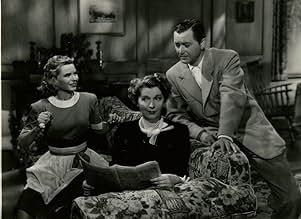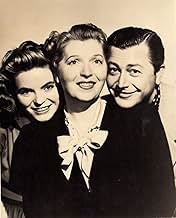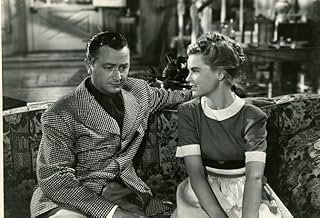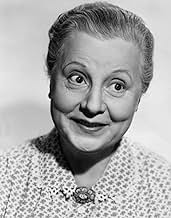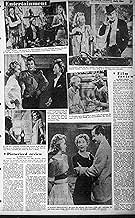Ajouter une intrigue dans votre langueChild bride Claudia Naughton has made life difficult for her husband David because she can't stand living so far away from her mother. She's also afraid that her husband doesn't find her des... Tout lireChild bride Claudia Naughton has made life difficult for her husband David because she can't stand living so far away from her mother. She's also afraid that her husband doesn't find her desirable enough. To remedy both situations, she sells their farm to an opera singer so they'... Tout lireChild bride Claudia Naughton has made life difficult for her husband David because she can't stand living so far away from her mother. She's also afraid that her husband doesn't find her desirable enough. To remedy both situations, she sells their farm to an opera singer so they'll have to move back to the city near her mother, and she tries to make her husband jealou... Tout lire
- Réalisation
- Scénario
- Casting principal
- Récompenses
- 3 victoires au total
- Hartley Naughton
- (non crédité)
- Maid
- (non crédité)
- Mrs. Feiffer
- (non crédité)
- Mr. Feiffer
- (non crédité)
- Carl
- (non crédité)
Avis à la une
Together they have a unique rapport on their Connecticut farm. Trouble is Claudia's wracked at times by self-doubt and her rather plain looks. Besides she's still somewhat dependent on her indulgent mom (Claire). Clearly, Claudia still has some growing up to do, especially in learning to deal with responsibility and life's dark side, which is what the movie's about.
Goulding directs with a light hand, never allowing the material to drift into sentimentality, the bane of domestic dramas such as this. And I love the sheer nuttiness of the Russian countess (Baclanova) when she breaks into her 5-alarm operatic screech that's like nothing I've seen or heard-- my ears are still ringing! But it's clearly McGuire's movie, showing why Claudia's warmth and charm launched the actress on such a long and successful film career. And I agree with another reviewer: if you like this film, you'll also like its sequel Claudia and David (1946), which is even better.
McGuire was 27 when this movie was made. Her "late" start in film, came after she had been on the stage. Her first role was at age 13 in an Omaha community playhouse. She then performed in high school and college, and wound up in summer stock at age 21. By 1937 she was acting on Broadway.
McGuire never won an Academy Award but was nominated for one, and later for three Emmy's for television. Of all the roles of the few actresses who received nominations in their debut films, McGuire was certainly deserving of an Oscar nomination here. But 1943 was like many another year during the golden age of Hollywood. So many very talented actresses were in as many great movies that made the competition exceptional that year. Jennifer Jones won the best actress Oscar for her role in "The Song of Bernadette;" over Ingrid Bergman in "For Whom the Bell Tolls." And three other great actresses nominated were Greer Garson, Jean Arthur and Joan Fontaine.
McGuire had many succeeding films with lead roles, most of which were highly successful films. While she did appear in a few TV series late in her career, she didn't have her own show or series. She made occasional movies in matronly or other dramatic roles, and she made TV movies as well. She also returned to the stage and helped Gregory Peck and some other actors form the La Jolla Playhouse.
Well, this is a fine movie about life, with McGuire's Claudia as a very young bride. She's almost immature, very energetic and almost childish in her enthusiasm at times. She is somewhat naïve, very close to her mother, and very much in love with her husband, played very well by Robert Young. This was McGuires first of three very successful pairings with Young. While he had a long career in cinema with many good films under his belt, Young will forever be remembered mostly as Marcus Welby, M. D., for that highly popular TV series that ran for eight years from 1969 through 1976.
Others of the cast of this film give very good performances. Ina Claire is Mrs. Brown, Claudia's mother. Reginald Gardiner is a playwright neighbor in the Naughton's rural Connecticut setting. And, Olga Baclanova, the Russian actress who defected from the Soviet Union in 1925, has a nice role, adding some comedic spice to the film.
One word of caution for those who might think of watching this film in a family setting. The younger audiences of the 21st century may find this film hard to sit through. It is heavy with talking and dialogue. So, younger folks (through middle age, no doubt) who thrive on lots of action and relentless motion in their viewing may quickly be bored.
Everyone here is excellent. Robert Young is very good. Ina Claire -- the divine brittle comedienne of earlier days -- is immensely endearing as Claudia's ailing mother.
The movie is billed as a romantic comedy. And it is romantic. It is comic -- in a way that at times (e.g., the leitmotif about Young's missing $.25 pipe-scraper) presages television sitcoms.
But it has dark edges everywhere. A mournful quality hangs over it. It seems to say: "Yes, life holds romance. Yes, people can be very amusing when interacting with each other. But life is essentially tragic. Do enjoy life but remember: It is not all innocent flirtations and problems with the servants. It's filled with sad things that pop up when one least expects them." It's a charming movie and a wise one as well.
It's a fun movie none the less, and at times even moving, belonging to an era when mainstream culture was supposed to be genteel. If if were made today half of it would be set in the conjugal bed, with the leading characters naked most of the time. With considerable subtlety it's suggested in this film that indeed a good deal of the action is in the bedroom, but they never, of course, show any of it. It's easier today to see the virtues of such bright entertainment as this, though when it was first performed out the play, like so many others like it, was attacked at times rather brutally by intellectuals in left-wing journals. A case can be made for Claudia being no more than anodyne entertainment to please and flatter the bourgeoisie into thinking that they're nicer and smarter than they are in real life. Perhaps so. But as an artifact of its times Claudia is still a pretty good show, and on occasion a fascinating if Hollywoodized glimpse at how the comfortable middle classes lived in the years before the postwar boom.
Hollywood produced many movies to help in America's war effort, directly (propaganda) or indirectly (fostering our countries' ideals). This is one of these movies. It reveals, by ricochet perhaps, the beauty of American life, the kindness of people, the innocence of love in its broad meaning. Despite the rationing and the tragedy of the war years, it offered our parents, hope that life could be and was beautiful, that these principles were worth fighting for. It also projected an ideal for the population to emulate, a code of conduct so to speak. This way of thinking/living was spread all over the country through thousands of community theaters. It helped guide a generation long gone in the aftermath of the great depression and the lean war years ahead.
In our modern society where trouble, murder, and sins of mankind get front page in the news and create constant fear and lingering anxiety among us, movies like "Claudia" and its sequel bring comfort and peace in our minds. This film reminds us of who we once were, loving individuals who cared for one another. It brings us back at a time when we, Americans, cared for one another, when we would pick-up hitch-hikers, when we would lend money to friends, when the local bank would help you out of financial difficulty. Our country stood for something and provided relief and shelter to the rest of the world.
I give my appreciation to the director, the writers and the cast who made this movie, a model of Americana for us to follow. I also appreciate all the film lovers who take the time and effort to enlighten the users of IMDb with their details and comments about the movies they review. May God Bless America!
Signed: A Disabled Veteran of the War against Terrorism.
Le saviez-vous
- AnecdotesThe film had its world premiere in Omaha, Nebraska, Dorothy McGuire's hometown, in late August 1943.
- ConnexionsFollowed by Claudia and David (1946)
Meilleurs choix
Détails
- Date de sortie
- Pays d’origine
- Langue
- Aussi connu sous le nom de
- Claudia, esposa moderna
- Lieux de tournage
- Société de production
- Voir plus de crédits d'entreprise sur IMDbPro
- Durée1 heure 31 minutes
- Couleur
- Rapport de forme
- 1.37 : 1
Contribuer à cette page


